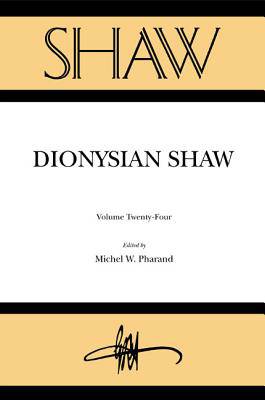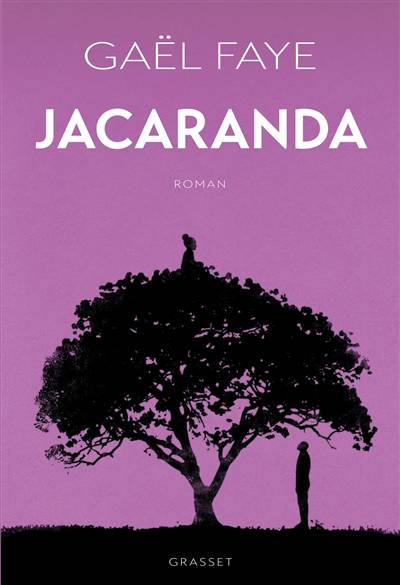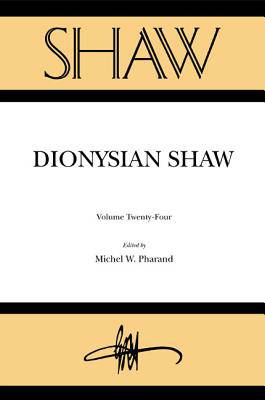
- Retrait gratuit dans votre magasin Club
- 7.000.000 titres dans notre catalogue
- Payer en toute sécurité
- Toujours un magasin près de chez vous
- Retrait gratuit dans votre magasin Club
- 7.000.000 titres dans notre catalogue
- Payer en toute sécurité
- Toujours un magasin près de chez vous
Shaw 24: Dionysian Shaw
Description
L. W. Conolly gives a comprehensive and detailed account of the twenty-five years of resistance by the Lord Chamberlain to the public presentation of Mrs Warren's Profession on the English stage. Conolly's examination of public and private commentary and correspondence of the Lord Chamberlain, his officials, Shaw, and various theater managers provides illuminating insights into the bizarre world of the British censorship system.
Bernard F. Dukore examines Major Barbara not from the perspective of discussion play or high comedy outlooks that frequently inform analyses of this comedy but from that of sexuality, which is central to a play that concerns two couples engaged to be married, a young man for whom his mother wants to arrange a marriage, and parents who were estranged after his birth. A prominent concern of Dukore's analysis is the implication of this perspective for actors and directors of the play.
Peter Gahan examines Shaw's engagement with Freud and the origins of psychoanalysis in the context of Shaw's 1922 translation into English of the German play Frau Gittas Suhne, written by his Viennese translator, Siegfried Trebitsch. Gahan further proposes a parallel between the transgressive adulterous relationship that propels the action of Jitta's Atonement and the transgression perpetrated by a translator on an author's original text.
Patricia Carter interviews Peter Tompkins, who makes public a previously confidential portion of Shaw's 4 December 1944 letter to Molly Tompkins (held in her son's private collection), thus revealing the true nature of their relationship.
Dan H. Laurence, approaching Mrs Warren's Profession as it passes its century mark, examines the Victorian underworld that forms its backdrop. He contends that the play's ethics have grown with the years and that it has found its niche among Shaw's most successful dramas.
Margery M. Morgan takes a cultural-historical view of Shaw's part in the movement away from "medieval ideas" toward enlightened understanding of sexuality and gender. In particular, she relates his thinking on these matters to the network of scientific Humanitarians and Arts-and-Crafts aesthetes that accepted the Dubliner into their society. Testimony to his courage and clarity, his reservations and defensive strategies, is drawn from his plays and letters across the years.
To demonstrate the claim that Shaw's imagination as it is revealed in the plays is intensely and complexly heterosexual, Harold E. Pagliaro passes over plays like Man and Superman, Major Barbara, and Misalliance, where the Life Force works overtly to unite lovers of its own choosing, and concentrates instead on Candida and Heartbreak House, plays in which complex perversions of the heterosexual ideal of the Life Force abound.
Karma Waltonen demonstrates how Shaw's Saint Joan illustrates his belief that the individual, through spirit and genius, can transcend the biological determinism of gender. In Shaw's vision, Joan is someone who has at least partially fulfilled that transcendence, and who, like Shaw himself, has been made abject because of her superiority.
Rodelle Weintraub offers another in a series of articles that examines the subtext of a manifest play to explicate the problem-solving dream in its latent play. Man and Superman, as a pre-absurdist play, seems deliberately to make little sense unless one views it as a problem-solving dream-play in which the latent play complements the manifest play and solves the deep-seated emotional problem of the dreamer.
Stanley Weintraub evokes the relationship over four decades between G.B.S. and Kathleen Scott, the attractive and talented woman who became wife, then widow, of Antarctic explorer Robert Scott. However avuncular Shaw considered his friendship to be, it always had a sensual, if safe, edge to it. Charlotte, whose marriage to Shaw was asexual, even let Kathleen teach G.B.S. to dance. Kathleen also sculpted him memorably and he put her subtly into his plays."
Spécifications
Parties prenantes
- Editeur:
Contenu
- Nombre de pages :
- 304
- Langue:
- Anglais
- Collection :
- Tome:
- n° 24
Caractéristiques
- EAN:
- 9780271025193
- Date de parution :
- 20-08-04
- Format:
- Livre relié
- Format numérique:
- Bibliotheekbinding
- Dimensions :
- 160 mm x 235 mm
- Poids :
- 644 g






